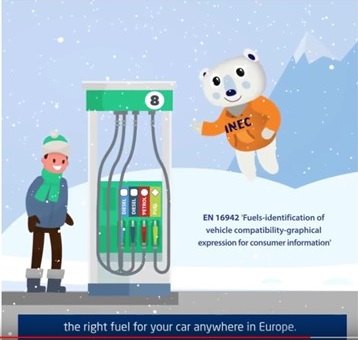Horizontal
How will standards meet the Future?
ANEC marked World Standards Day by launching a video to publicise new labels for fuel identifiers as an example of how standards make consumers’ everyday lives easier. We helped draft EN 16942 that defines new labels to help consumers identify the compatibility between their vehicles and the alternative fuels now on sale across Europe. These labels are applicable for new vehicles registered from 12 October 2018. More information on the labels is available in our video and infographic.
Please click on the image below to watch the video.
A new online eLearning course
ANEC, ECOS, ETUC and CEN-CENELEC have developed a free interactive eLearning course on standards which was released on 12 October during the World Standards Day conference hosted by the three European Standardisation Organisations, in cooperation with the EC and EFTA. The course provides clear information about standards and the standards development process in Europe, and also at the national and international levels.
If you want to discover the world of standards, this training is for you! Follow our course and find out why standards are relevant, and how you can join in developing standards that benefit all. The course can be found at www.standards4all.eu
Please find more information in ANEC press release.
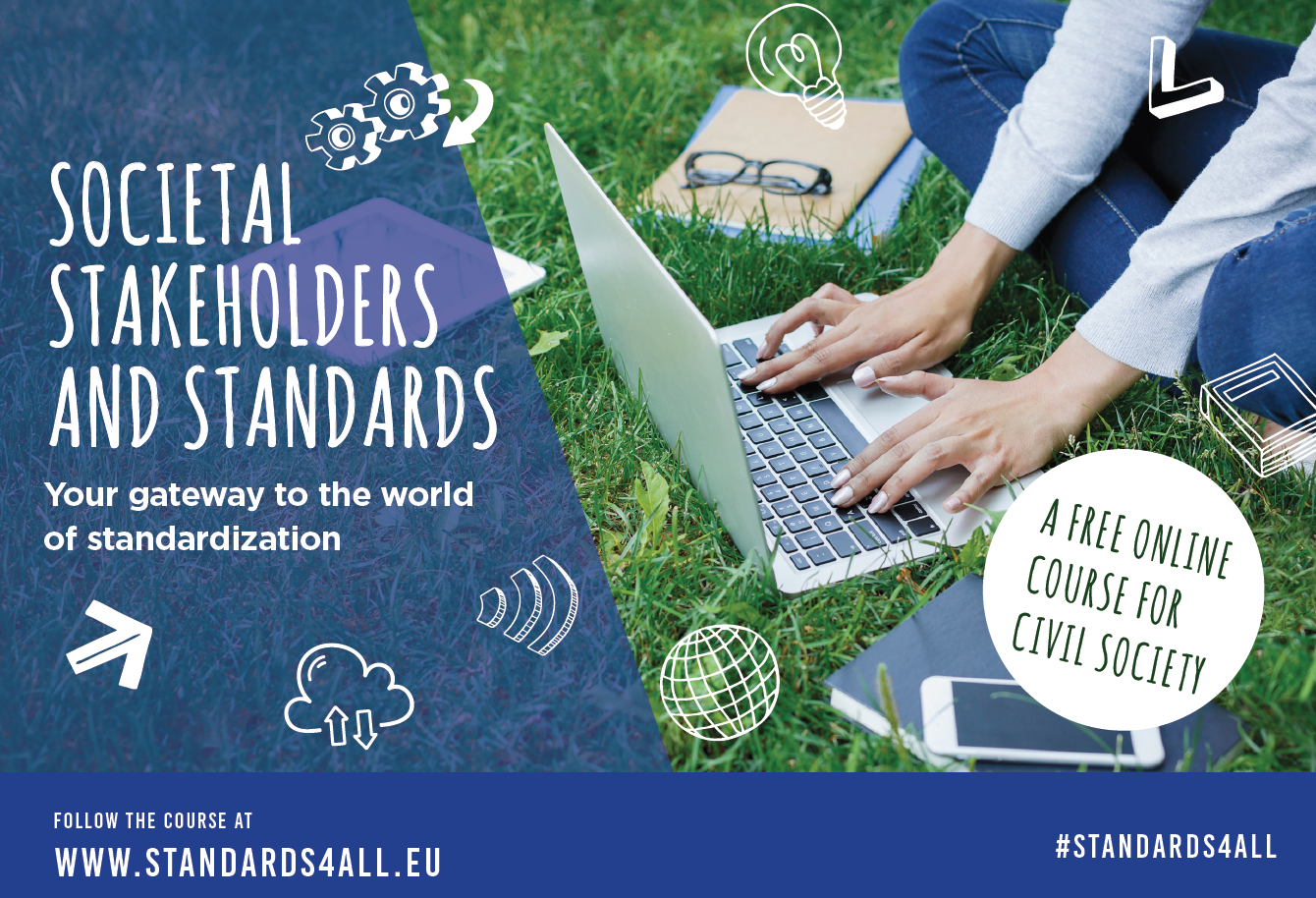
IMCO votes on the Enforcement and Compliance proposal
In September 2018, the IMCO Committee of the European Parliament approved its report on the proposed Compliance & Enforcement Regulation.
We welcome the Committee adopting several amendments in the approval of the report. These intend to strengthen the market surveillance of products sold online; to introduce “reference persons” for non-EU companies, and to require national authorities to address emerging safety threats and risks, such as those related to the ‘Internet of Things’, in their market surveillance strategies. The report also foresees cooperation among authorities being facilitated by creation of a “Product Compliance Union”.
However, the Committee did not support Compromise Amendment 8 which would have required reference to the Precautionary Principle, much to our regret. Similarly, the Committee did not choose to extend the provisions of the proposal to non-harmonised products. Furthermore, national authorities will be allowed to conclude agreements with companies in order to provide advice on compliance, which we see as a potential conflict of interest.
The next step is the proposed approval of the report by the plenary of the European Parliament in October, and start of the negotiations with the Council.

EPC looks ahead on standards
On 9 October, ANEC Secretary-General, Stephen Russell, was a member of the latest European Policy Centre “Single Market Roundtable”. Led by the former Chair of the EP IMCO Committee, Malcolm Harbour, the Roundtable discussed European Standardisation, especially in the political context of the new European Commission that will be appointed in 2019.
In a review of the implications of the “James Elliott” ruling by the European Court of Justice, which is requiring the EC to reinforce its assessment of candidate Harmonised Standards (i.e. those intended to support implementation of European legislation), Mr Russell supported calls for a balance between “control and proportionality”. In answer to a point that the added checks could dissuade industry from continuing with the New Approach, he hoped pragmatism would prevail. He did not believe it would be in the interests of societal stakeholders, or SMEs, if multi-national business decided to prefer type-testing to standardisation. More broadly, he urged the development of a European legal framework for the safety of services, noting that consumers were suffering detriment cross-border which could not be solved by standards alone, and raised the expectations held by consumers in the ethical application of Artificial Intelligence.
ANEC active in ICPHSO International Symposium
The ICPHSO 2018 International Symposium will take place in Brussels on 12-13 November, as part of the European Commission’s International Product Safety Week. The theme of this year’s programme is “Alignment & Inclusion in a Divergent World.”
ANEC will join two panels during the Symposium: ‘Safety of Toys: Steps toward alignment’ and ‘Designing products for diverse global populations’. More information here.
Child Safety
Evaluation of the Toy Safety Directive
In August, ANEC contributed to the EC’s Roadmap for the evaluation the Toy Safety Directive. Although the Directive has certainly brought improvements to toy safety in Europe, we believe some issues need to be addressed.
Most importantly, the requirements for chemicals in toys need to be strengthened significantly. The Directive must also be updated to ensure that it is in line with the new ‘security for safety’ concept of the general legal framework, as detailed in the ANEC-BEUC position on ‘Cybersecurity of connected products’.
Specific requirements for visibility and legibility of warnings on toys (e.g. a minimum font size) need to be introduced, in order to enable Member States to enforce such requirements in a uniform way. We are also concerned online sales sometimes omit warnings and other consumer information that should be associated with the toy.
We stressed the need to improve the market surveillance of toys, among other products; to set up a pan-European accidents & injuries database in order to collect comprehensive information about accidents and injuries that occur because of dangerous toys; and to improve traceability along the supply chain, particularly for toys sold online. See the full ANEC reply.
In line with our position, we will also contribute to the public consultation on the Evaluation of the Toy Safety Directive, which runs until 12 December.

ANEC helps tackle trampoline park accidents
On 10 and 11 October, ANEC participated in the kick-off meeting of CEN TC 136 WG17, a new working group established to develop a European standard for trampoline parks. The past few years have seen a growth in parks that are equipped and run commercially. The individual halls are kitted out according to the requirements of the manufacturer, and are often run as halls with other sports. Such halls are also popular for events such as birthday parties. But there are also concepts that are mainly addressed to groups with professional sports knowledge (e.g. the so-called "freestyle athletes").
One of the challenges of these parks is that the trampolines are used in combination with other products or activities (e.g. climbing walls, basketball goals). We have joined WG17 to ensure the standard will allow children and teenagers to enjoy trampoline parks safely, without risk of serious injury or accident.

ISO/IEC Guides published
ANEC welcomes publication of the revised ISO/IEC Guide 41 ‘Packaging - Recommendations for addressing consumer needs’. It addresses the most suitable packaging for products intended for consumers, in terms of containment, protection, handling, transport, storage, convenience, information and presentation. The Guide reflects new developments and best practice in labelling, recycling, risk management and consumer vulnerability. ANEC contributed to the revision. Christine Heemskerk, a member of the ANEC Child Safety and Domestic Appliances Working Groups, was Co-Convenor of the ISO/COPOLCO working group that led the revision. More information.
We also welcome the publication earlier in the year of ISO/IEC Guide 14 ‘Products and related services - Information for consumers’, work to which we also contributed. More information.
Accessibility
Open letter to EU institutions on accessibility
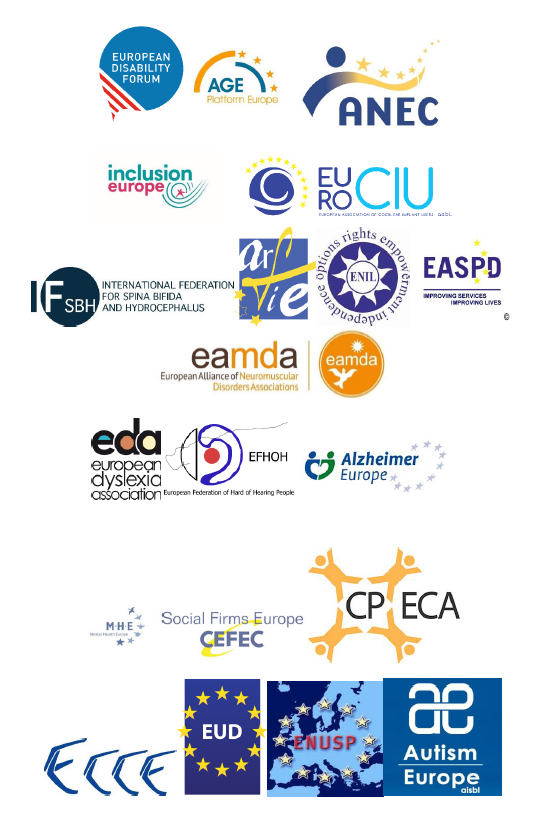 On 27 September, ANEC joined the European Disability Forum (EDF), AGE Platform Europe and 17 other organisations in signing an open letter which urges Member States to strengthen the European Accessibility Act significantly ahead of the EU interinstitutional negotiations. We call on EU leaders to agree an ambitious Act before 3 December 2018, the European Day of Persons with Disabilities. The next trialogue meeting will be held on 8 November.
On 27 September, ANEC joined the European Disability Forum (EDF), AGE Platform Europe and 17 other organisations in signing an open letter which urges Member States to strengthen the European Accessibility Act significantly ahead of the EU interinstitutional negotiations. We call on EU leaders to agree an ambitious Act before 3 December 2018, the European Day of Persons with Disabilities. The next trialogue meeting will be held on 8 November.
The role of standards in Active Ageing
Active and healthy ageing (see the UNECE Active Ageing Index), as well as the implications at both individual and collective level, were discussed during the General Assembly meeting of the European Covenant on Demographic Change, held in Bilbao on 26 September. ANEC participated as a member of the Board of Directors.
For many years, ANEC has lobbied for the use of standards to enhance the safety and usability of products and services for older people, and for people with disabilities.
If standards for mainstream products and services do not meet the needs of all consumers, then many products and services cannot be used by a significant minority of the population. We believe standards are a suitable tool to mainstream accessibility if Design for All principles are applied. Design for All (DfA) means designing everyday products and services so that as many people as possible can use them, regardless of age or ability.
The meeting also saw the Covenant take over the reins of the European Silver Economy Awards which aim to at promote partnerships under the common vision of an age-friendly Europe.

Domestic Appliances
Annual meeting of the ANEC DOMAP WG
The annual meeting of the ANEC Domestic Appliances Working Group took place on 19-20 September in London, kindly hosted by ‘Which?’.
Our experts discussed developments in standardisation and legislation, as well as challenges related to safety, performance, ecodesign & energy labelling, accessibility & usability, and the market surveillance of household appliances (which include electrical appliances, gas appliances and machinery).
A brainstorming was held on the evaluation of the Low Voltage Directive, led by Karin Both, Chair of the DOMAP WG. Its outcome will help shape the ANEC contribution to the evaluation.
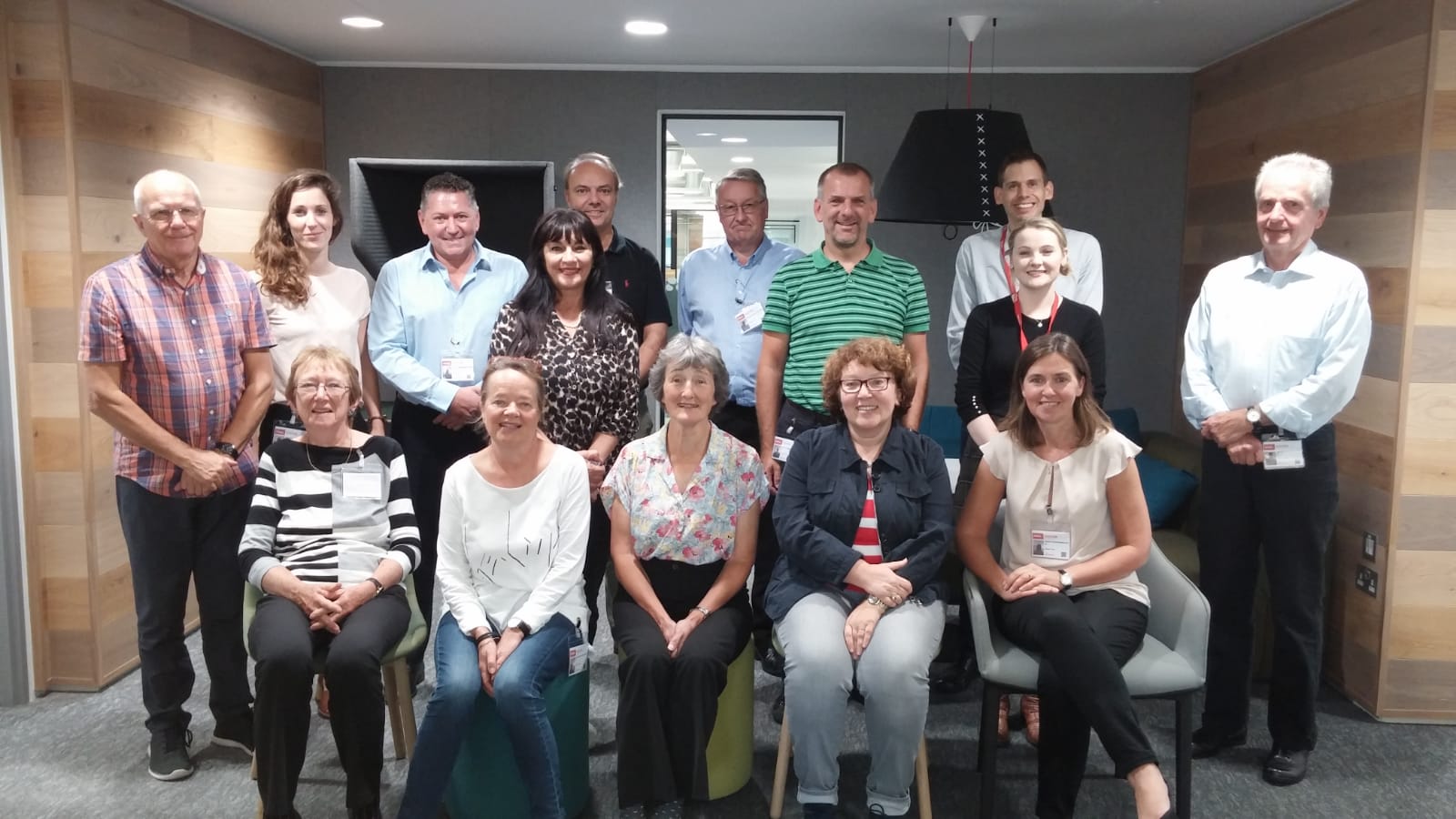
New ISO standard on unit pricing
ANEC welcomes adoption of ISO 21041 ‘Guidance on unit pricing’, prepared by ISO PC 294. We contributed to the development of the standard as a liaison member of the committee.
Unit pricing of household products is relevant for European consumers in facilitating comparison of prices. The legibility of displayed unit prices on shelves in stores has been an area of concern. Complaints about illegible unit prices have been reported frequently, and small font sizes cause a major difficulty. Unit prices displayed on lower and higher shelves cause problems due to the viewing distance. ISO 21041 intends to address these problems, and help retailers and market surveillance bodies take legibility into account. ANEC introduced members of ISO PC 294 to the concept of calculating legible character heights for unit prices, and to the challenges consumers with special needs face.
ISO 21041 is expected to be published this year.
Preventing Carbon Monoxide poisoning

We will participate in the 8th Carbon Monoxide Round Table, hosted by MEPs Marian Harkin and Linda McAvan, as well as CoGDEM, on 6 November in the European Parliament, Brussels. This year's edition will focus on the health dimensions of CO, from awareness of the symptoms of a CO poisoning to diagnosis, first response and patients’ treatment.
Eco-design
Tyre labelling negotiations start
The EC released a proposal to revise the Tyre-Labelling Regulation which reflects ANEC’s main recommendations, such as the need to provide information on snow and ice grip, as well as on the sustainability of tyres. There are also proposals to align the Regulation with the Energy-labelling scheme, another of our recommendations. We shall now follow the inter-institutional negotiations to ensure our proposals are supported by the Council and the Parliament.
Ecodesign ‘package’ delayed
In July, the EC announced a ‘package’ of Ecodesign and Energy labelling measures for five “fast-track” products (household washing machines, dishwashers, refrigerators, lighting and electronic displays) would be postponed to 2019 from November 2018. We are concerned this delay will mean that consumers miss savings, and further resources are wasted, as measures for fast-evolving products (such as TVs) become outdated. In order to reinforce political commitment to Ecodesign and ensure the benefits of Ecodesign are realised speedily and effectively, we will urge the EC to abandon the package approach.
End of inefficient halogen bulbs
Thanks to our efforts under Ecodesign for lighting, the EU has banned inefficient halogen bulbs from September 2018. In practice, this means that halogen bulbs will be on sale until stocks are depleted. Halogen spotlights were already been phased out in 2016. The ban is expected to lead to an uptake of LEDs and help consumers save money in the longer term. UK consumer group Which? found that, in comparison with halogen lightbulbs, LEDs last much longer and are cheaper to run. The EC highlights that the forthcoming switch will bring about a collective “yearly energy saving equal to the annual electricity consumption of Portugal.” The share of LED lamps available on the market meanwhile is expected to increase due to continuing improvements in LED technology. The prices of LEDs are also falling, which is added good news for consumers.

Digital Society
Achieving trustworthy Artificial Intelligence
ANEC joined the CEN-CENELEC Stakeholder Workshop, ‘Trustworthy Artificial Intelligence’, held in Brussels on 18 September. ANEC Deputy Secretary-General, Chiara Giovannini, participated in a discussion on the role of standardisation in the soft and hard implementation of the built-in characteristics of AI systems. Our expectation from European Standardisation is that it provides an open and inclusive forum to build the broadest consensus in earning consumer trust in AI standards.
Please click on the image below to watch the video.
Web Accessibility standard published
The standard EN 301 549 V2.1.2 ‘Accessibility requirements for ICT products and services’ has been approved, published and is now freely available online at ETSI website.
The standard was drafted by the CEN/CENELEC/ETSI JWG ‘eAccessibility’, and the ETSI TC ‘Human Factors’, and will be used to provide presumption of conformity to the Directive on the accessibility of the websites & mobile applications of public sector bodies (“Web Accessibility Directive”), which became applicable on 23 September 2018. Member States have 12 months to make their websites accessible.
ANEC invites public authorities and web developers to use the standard to design web-sites and apps that can be used by all consumers, irrespective of age or ability.

A better standard to protect our hearing?
Several years ago, ANEC led the campaign "Pump down the volume!" which aimed at lowering the sound level in Personal Music Players and smart phones in order to protect the hearing of younger people and children. The campaign convinced the EC to request CENELEC to set safe sound limits by default in the related standards.
The first outcome of our successful campaign came in 2011 with the adoption of new standards for Personal Music Players: EN 60065:2002/A12:2011 "Audio, video and similar electronic apparatus - Safety requirements" and EN 60950-1:2006/A12:2011 "Information technology equipment - Safety -- Part 1: General requirements".
Since then, we have been working on a sound level dosage system which is now detailed in prEN 62368-1:2014/prAD:2018. Among other improvements, it provides the user with much-needed information on safe periods for listening. The aim is to avoid young consumers potentially reaching the safe maximum weekly dosage in a matter of minutes, and then continuing to listen at a high volume simply by acknowledging a warning.
Nevertheless, the concerns of some CENELEC members need to be addressed by CENELEC TC 108X WG 3 ahead of the launch of Formal Vote. Watch this space.

Smart Meters & Smart Grids
Empowering consumers in the Clean Energy Transition
ANEC participated in the Citizens’ Energy Forum held in Dublin during September. This year's edition, hosted by the EC in collaboration with the Irish Commission for Regulation of Utilities (CRU), marked the Forum's 10th anniversary The meeting focused on the role of consumers in the energy market in the context of measures proposed by the Clean Energy for all Europeans package and the recently adopted New Deal for Consumers package. The conclusions of the Forum can be found here.
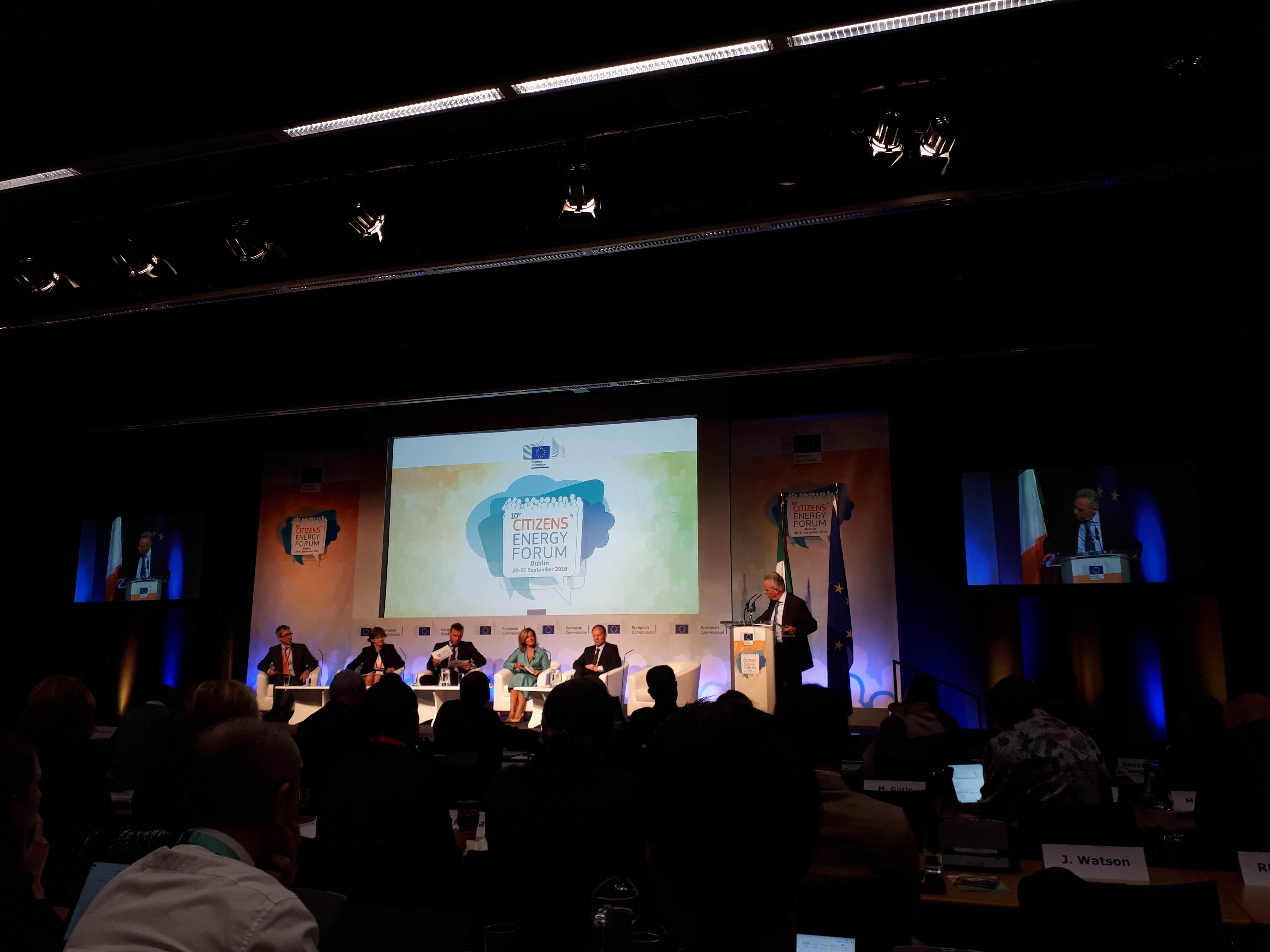
Data protection of smart meters
ANEC was a participant at the presentation of the Data Protection Impact Assessment (DPIA) Template for Smart Grids and Smart Metering Environment. The template aims to offer guidance to the operators of smart grids and smart meters in complying with the General Data Protection Regulation (GDPR), noting their processing of personal data. It is the result of the consensus reached among experts within the Smart Grids Task Force. ANEC contributed to the development of the template and welcomes its publication.
Services
Developments in the postal sector
In September, ANEC joined the EC workshop, 'Delivering for the future II: Developments in the postal sector'. WIK Consult presented the interim findings of a study on developments in the cross-border e-commerce parcel delivery market, including the results of a consumer survey. First indications are that consumers’ cross border and national e-commerce purchases focus on fashion and electronics. Home delivery is the preferred delivery option. In a comparison of national and cross-border delivery services, consumers rated national services slightly better than cross-border. During the workshop the Commission gave an update on the implementation of the Regulation on Cross-border Parcel Delivery Services, adopted in April 2018. (Regulation (EU) 2018/644). More information.

Traffic & Mobility
ANEC presents the next generation of CRS
ANEC joined the inaugural TASS International & Code Product Solutions seminar, 'The Latest Insights into CRS Development’, held on 19 September in Helmond, the Netherlands. It looked into the most efficient methods to develop a Child Restraint System (CRS) that meets the latest safety requirements, while keeping time-to-market as short as possible. ANEC presented an overview of the next generation of CRS. We also noted a rising number of child deaths due to hyperthemia (see our leaflet for more information on deaths in hot cars). According to the data, most children who died were ‘forgotten’, something that could have been prevented by a child-presence detection system.
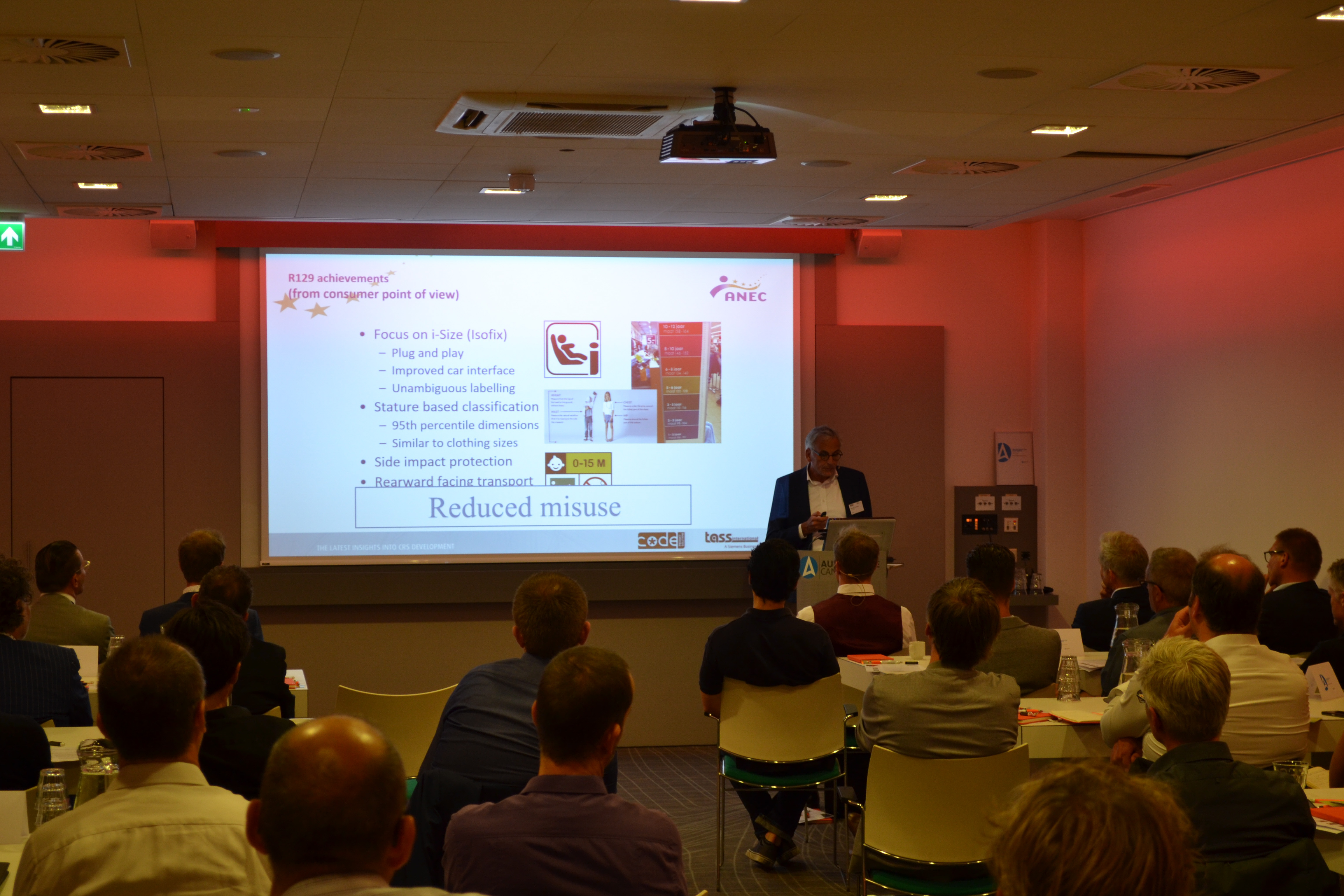
Other
ANEC co-sponsoring national training in Czech Republic
ANEC will join the “Children and the City – Play Spaces” conference, organised by the Faculty of Architecture of the Czech Technical University in Prague, on 25-26 October.
The conference will focus on playgrounds, their design and safety. It aims at introducing participants to the updated CSN EN 1176, which comes into force in October 2018, and to bring together all actors involved in the design, creation, maintenance, and inspection of play spaces to reach a common long-term vision. Helena Menezes, who represents ANEC in CEN/TC 136/SC 1 dealing with standards for playground safety, will participate in the conference and bring her expertise in explaining how standards can affect design, and adapting existing playgrounds to new standards.
| List of comments 2018 | List of meetings 2018 |
For comments or if you wish to write an article for the ANEC Newsletter, please contact: Ieva GALKYTÉ (This email address is being protected from spambots. You need JavaScript enabled to view it.).
